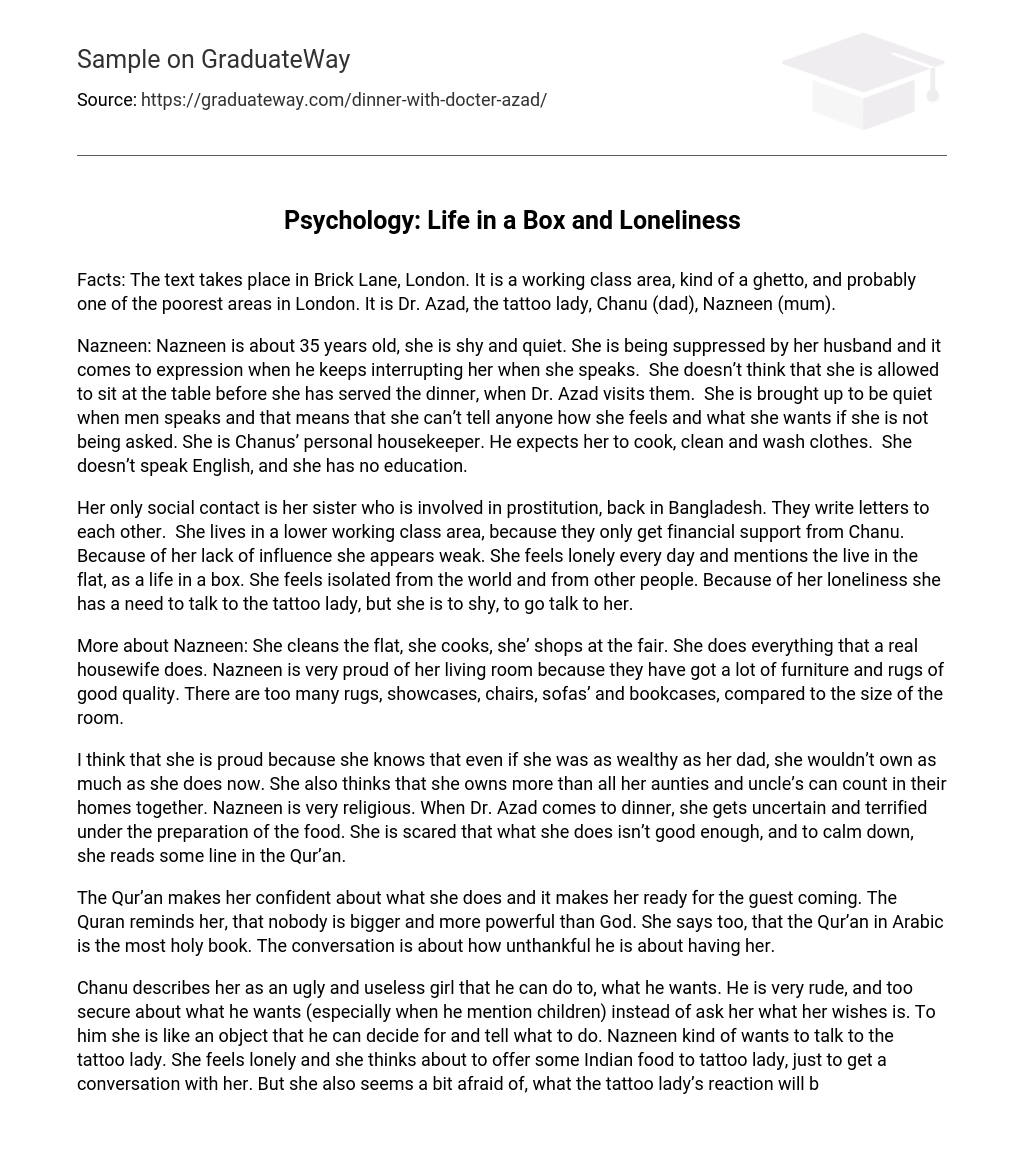Facts: The text is set in Brick Lane, London, which is a working-class area referred to as a ghetto and considered one of the poorest areas in the city. The characters involved are Dr. Azad, known as the tattoo lady, Chanu (the father) and Nazneen (the mother).
Nazneen is a shy and quiet woman, approximately 35 years old. Her husband suppresses her, as seen when he constantly interrupts her while she is speaking. She believes she must serve dinner before sitting at the table when Dr. Azad visits, indicating her upbringing to be submissive in the presence of men. This upbringing prevents her from expressing her feelings or desires unless specifically asked. Nazneen works as Chanus’ personal housekeeper, responsible for cooking, cleaning, and laundering. She does not speak English and lacks formal education.
Her only social contact is her sister, who is involved in prostitution back in Bangladesh. They communicate through letters. She resides in a lower working-class area due to her reliance on Chanu’s financial support. Her lack of influence makes her appear weak. The monotony of her everyday life in the flat feels confining, like living in a box. She experiences a deep sense of isolation from the world and other people. Despite feeling lonely daily, she is too shy to approach the tattoo lady for conversation.
More about Nazneen: She performs various domestic tasks such as cleaning the flat, cooking, and shopping at the fair. She handles all the responsibilities expected from a true housewife. Nazneen takes great pride in the quality of her living room, which is filled with abundant furniture and high-quality rugs. The room is slightly overcrowded with numerous rugs, showcases, chairs, sofas, and bookcases in relation to its size.
I believe she takes pride in knowing that even if she possessed the same wealth as her father, it would still be less than what she currently owns. Additionally, she believes that her possessions exceed the combined count of all her aunts and uncles’ belongings. Nazneen is highly religious and becomes anxious and frightened when Dr. Azad visits for dinner. She worries that her cooking may not meet expectations and seeks solace in reading a verse from the Qur’an.
The Qur’an gives her confidence and prepares her for the arrival of guests. It reminds her that God is the greatest and most powerful. She also believes that the Qur’an in Arabic is the holiest book. The discussion revolves around his lack of gratitude for having her.
Chanu views her as an unattractive and insignificant girl whom he can manipulate as he pleases. He displays rudeness and an overly assertive attitude, particularly when it comes to discussing children, instead of considering her desires. In his eyes, she is merely an object that he can control and give orders to. On the other hand, Nazneen has a desire to converse with the tattoo lady. She feels isolated and contemplates offering some Indian cuisine to initiate a conversation. However, she also harbors some fear regarding the potential reaction from the tattoo lady.
Chanu can be described as a 40-year-old individual with a more rounded physique, indicating he is overweight. His behavior may not be ideal, but this could be attributed to his upbringing, where he learned that men should exert control and women exist solely to satisfy them. These beliefs seem to influence his actions. Despite being Pakistani, Chanu possesses an impressive education, likely surpassing that which he would have received in England. His aspirations for a promotion are unlikely to be fulfilled, sadly this is something he fails to recognize. He believes everyone else is incorrect if they do not share his viewpoint.
When Chanu first arrived in the UK, he aspired to become the Prime Minister’s secretary. However, his current situation is far from his initial ambition – he holds a low-paying job with no prospects for promotion. Strangely, Chanu seems oblivious to this reality, perhaps because he has convinced his family that he is superior to others. Unfortunately, Chanu despises this situation and finds it reminiscent of extreme racism. There are even parties that deny the occurrence of the Holocaust and advocate for the supremacy of white people.
Dr. Azad, Chanus’ doctor, is a deeply religious and highly educated individual. He exudes eloquence and courtesy, with a particular emphasis on adhering to the teachings of the Qur’an, particularly in relation to young Muslims consuming alcohol. Dr. Azad embodies wisdom and commands respect.
The text addresses several key concerns:
- Religion/culture
- How to treat a woman
- A woman’s duties/tasks compared to the mans
Equality:
- How to be equal in a family?
- To help each to get a good daily routine
- To feel relaxed with each other
- To respect others needs and thoughts.
Gratitude:
- To appreciate what other people do for you
- To appreciate what you have got.
The message:
- Monica Ali wants to show us some cultural differences and give us an insight into the Paki culture. She is dealing whit cultural issues like equality in families and women rights. She brings up examples of immigration in the family.
- Chanu is trying to immigrate by his job but because of the culture Nazneen doesn’t have the possibility to immigrate. She doesn’t speak English well, and that makes it difficult for her to get at social network.
- We think that it was interesting to get an insight into the Paki culture. It was exiting to compare the Paki culture with our own culture.





